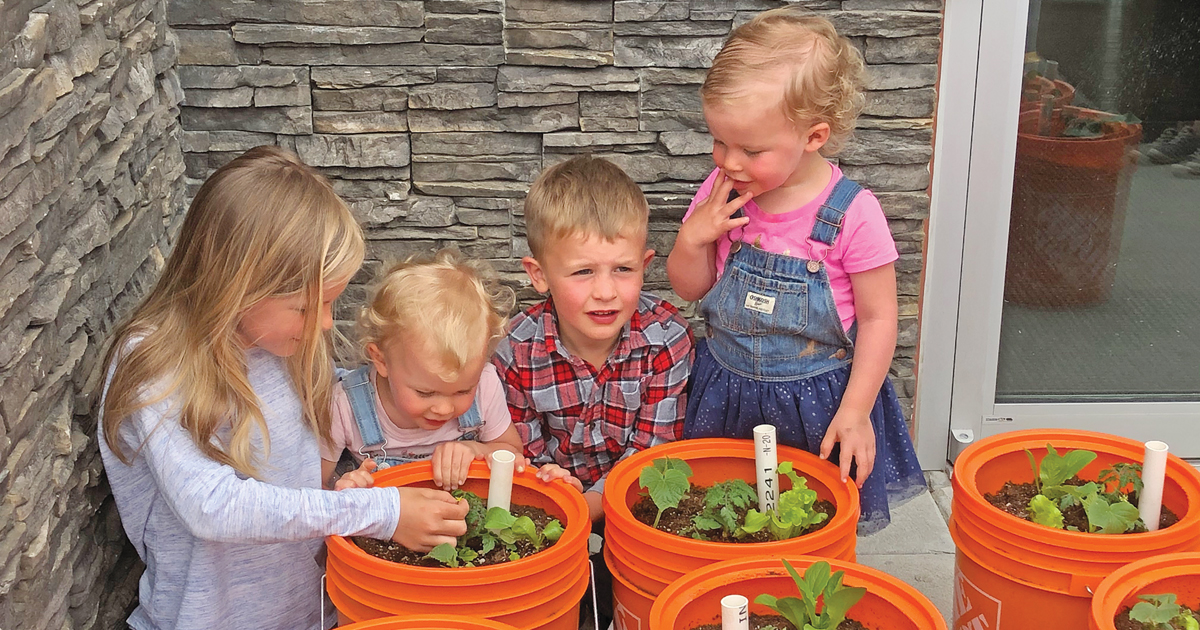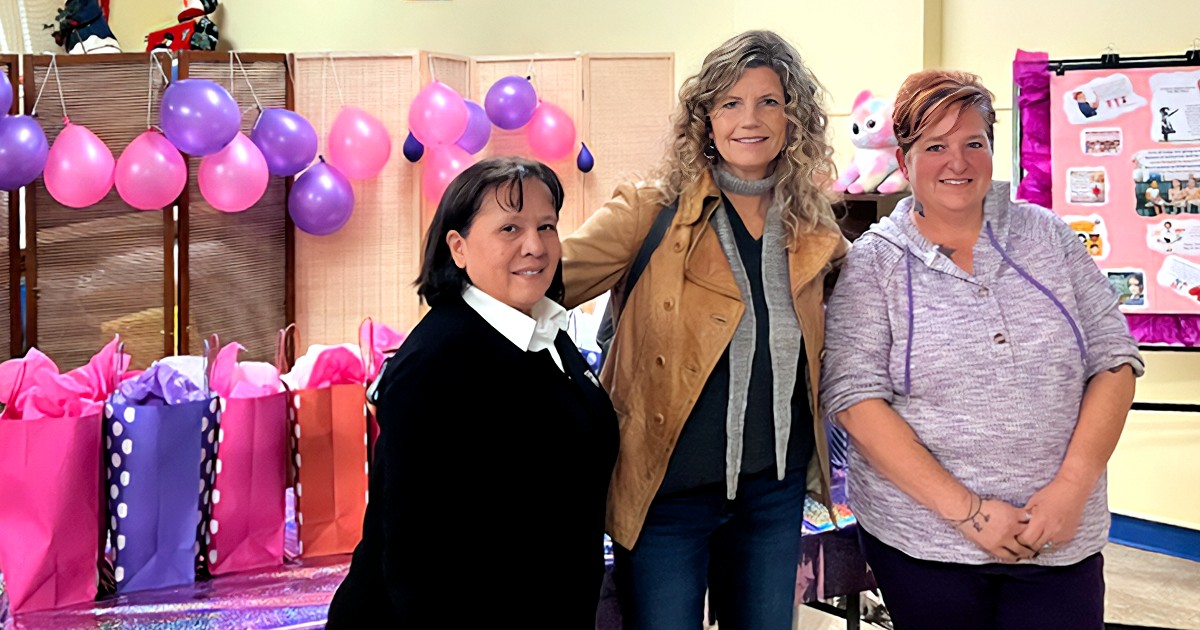(Above) Esther Gardner’s four children, Sophie, Abigail, Hudson and Brielle, check out the bucket gardens available for free at The Salvation Army’s Renew Church and Community Ministries (Photo: Lt Jennifer Henson)
One in six children live in poverty in Central Okanagan, the B.C. Child and Youth Advocacy Coalition reported earlier this year. As startling as that is, it’s more disheartening to know the research was conducted prior to the COVID-19 pandemic, which has caused a record-high unemployment rate.
One in six children live in poverty in Central Okanagan, the B.C. Child and Youth Advocacy Coalition reported earlier this year. As startling as that is, it’s more disheartening to know the research was conducted prior to the COVID-19 pandemic, which has caused a record-high unemployment rate.
Negatively impacting the health, finances and mental health of many Canadians, the virus has wreaked havoc—especially for those who struggle to put food on the table.
Fighting food insecurity is one reason why The Salvation Army’s Renew Church and Community Ministries in West Kelowna, B.C., distributed 25 free, self-watering bucket gardens—each containing a Tiny Tim tomato, cucumber and lettuce seedling—to the community in June.
“We just put it out there and said, ‘If you’re interested in gardening and want to get your hands dirty, then try it out,’ and the buckets went really quickly,” says Lieutenant Jennifer Henson, corps officer. “We didn’t screen people because we’re trying to work past stereotypes people have about coming to The Salvation Army, mainly that you don’t have to be ‘down and out’ to finally come to us.
“If we can help interrupt cycles of poverty earlier on, then it will be our privilege to do so.”
Serving the Westbank, West Kelowna and Peachland communities, the Army operates a thrift store and addresses food insecurity through education and food literacy. “There’s a saying, ‘You can either give someone a fish or teach them to fish,’ so that’s the approach we’re taking to empower people to provide for their own food needs,” says Lieutenant Henson.
The bucket gardens were a collaboration with Incredible Edible Okanagan, an organization that has been dedicated to improving access to locally grown food for the past five years.
“This year, because of COVID-19, a lot of people are aware of food insecurity and have started gardening, for that reason and also for mental-health reasons,” says Lois Beischer, founder of the organization, who first met Lieutenant Henson at a community event. “I had a variety of seeds to help someone who is food insecure start their own garden in their yard and gave them to Lieutenant Henson to hand out. From there, it grew to the bucket gardens.”
Beischer, who planted the first community garden in the Okanagan in the 1990s, is passionate and motivated by this work. Securing a grant from her insurance company, Foresters, as well as donations from Home Depot and Middlebench Gardens, she and a dedicated team of volunteers carefully put each bucket garden together.
“Anyone could be a paycheque away from going hungry and we’re called to support each other,” says Beischer. “If doing something small like growing a garden moves you on a different trajectory in life, it’s just amazing.”
Candice Loh, a first-time gardener, is thrilled that her plants are thriving. Living in a condo in downtown Kelowna, she has so far used the crops for multiple meals and has replanted several others.
“This is a great idea for anyone who has never gardened before, to get a taste of gardening and know if it’s something you can do,” she says. “I’m loving the experience and it has given me inspiration for the future.”
Esther Gardner, a West Kelowna resident, has enjoyed cultivating an interest in gardening among her four children.
“It’s so kind of the organizers to give out all the seeds and buckets to help people during COVID-19, both with food and something to do,” she says. “As a family, we learned how to make a self-watering container, and it’s been nice to have some extra food on our balcony.”
The Army and Incredible Edible Okanagan hope to continue the bucket garden program, with plans to work with a school in the fall, develop a curriculum, talk about food insecurity, help students grow food from seed and plant a passion for gardening.
“I want to encourage ministry units to keep their eyes open for ways to partner with assets that are already present in your communities,” says Lieutenant Henson. “We were approached about whether we wanted to be a part of this, said ‘yes,’ and now opportunities and doors are opening.
“If we play our part, collaborate and work well with others, our ability to impact communities for good will be exponentially greater than if we try to do things on our own.”
To find out how to grow your own self-watering garden bucket, visit youtube.com/watch?v=maoWthQVo94.
Melissa Yue Wallace is a freelance writer living in Richmond Hill, Ont.
Fighting food insecurity is one reason why The Salvation Army’s Renew Church and Community Ministries in West Kelowna, B.C., distributed 25 free, self-watering bucket gardens—each containing a Tiny Tim tomato, cucumber and lettuce seedling—to the community in June.
“We just put it out there and said, ‘If you’re interested in gardening and want to get your hands dirty, then try it out,’ and the buckets went really quickly,” says Lieutenant Jennifer Henson, corps officer. “We didn’t screen people because we’re trying to work past stereotypes people have about coming to The Salvation Army, mainly that you don’t have to be ‘down and out’ to finally come to us.
“If we can help interrupt cycles of poverty earlier on, then it will be our privilege to do so.”
Serving the Westbank, West Kelowna and Peachland communities, the Army operates a thrift store and addresses food insecurity through education and food literacy. “There’s a saying, ‘You can either give someone a fish or teach them to fish,’ so that’s the approach we’re taking to empower people to provide for their own food needs,” says Lieutenant Henson.
The bucket gardens were a collaboration with Incredible Edible Okanagan, an organization that has been dedicated to improving access to locally grown food for the past five years.
“This year, because of COVID-19, a lot of people are aware of food insecurity and have started gardening, for that reason and also for mental-health reasons,” says Lois Beischer, founder of the organization, who first met Lieutenant Henson at a community event. “I had a variety of seeds to help someone who is food insecure start their own garden in their yard and gave them to Lieutenant Henson to hand out. From there, it grew to the bucket gardens.”
Beischer, who planted the first community garden in the Okanagan in the 1990s, is passionate and motivated by this work. Securing a grant from her insurance company, Foresters, as well as donations from Home Depot and Middlebench Gardens, she and a dedicated team of volunteers carefully put each bucket garden together.
“Anyone could be a paycheque away from going hungry and we’re called to support each other,” says Beischer. “If doing something small like growing a garden moves you on a different trajectory in life, it’s just amazing.”
Candice Loh, a first-time gardener, is thrilled that her plants are thriving. Living in a condo in downtown Kelowna, she has so far used the crops for multiple meals and has replanted several others.
“This is a great idea for anyone who has never gardened before, to get a taste of gardening and know if it’s something you can do,” she says. “I’m loving the experience and it has given me inspiration for the future.”
Esther Gardner, a West Kelowna resident, has enjoyed cultivating an interest in gardening among her four children.
“It’s so kind of the organizers to give out all the seeds and buckets to help people during COVID-19, both with food and something to do,” she says. “As a family, we learned how to make a self-watering container, and it’s been nice to have some extra food on our balcony.”
The Army and Incredible Edible Okanagan hope to continue the bucket garden program, with plans to work with a school in the fall, develop a curriculum, talk about food insecurity, help students grow food from seed and plant a passion for gardening.
“I want to encourage ministry units to keep their eyes open for ways to partner with assets that are already present in your communities,” says Lieutenant Henson. “We were approached about whether we wanted to be a part of this, said ‘yes,’ and now opportunities and doors are opening.
“If we play our part, collaborate and work well with others, our ability to impact communities for good will be exponentially greater than if we try to do things on our own.”
To find out how to grow your own self-watering garden bucket, visit youtube.com/watch?v=maoWthQVo94.
Melissa Yue Wallace is a freelance writer living in Richmond Hill, Ont.










Leave a Comment